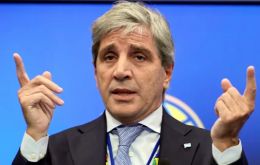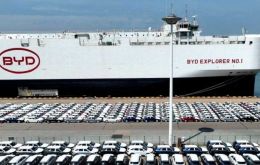MercoPress. South Atlantic News Agency
Tag: Luis Caputo
-
Tuesday, February 10th 2026 - 21:14 UTC
Argentina: January inflation hits 2.9% and 12-month rate reaches 32.4%, INDEC says

Argentina’s inflation came in at 2.9% in January, taking the 12-month rate to 32.4%, according to the national statistics agency INDEC. The reading marked an acceleration of 0.1 percentage points from December.
Add your comment! -
Tuesday, February 10th 2026 - 04:25 UTC
Argentina faces ARS 10 trillion maturities as Treasury sets Feb. 11 debt auction menu

Argentina’s Economy Ministry published the instrument menu for the Feb. 11 debt auction, closely watched by markets given the size of maturities: nearly ARS 10 trillion (around USD 7 million), about ARS 9 trillion of which is held by private investors.
Add your comment! -
Wednesday, February 4th 2026 - 02:51 UTC
Argentine shares slide in New York as country risk climbs above 500 points

Argentine stocks and hard-currency bonds fell on Tuesday, hit by a risk-off turn in global markets and fresh domestic uncertainty tied to the stalled overhaul of inflation measurement following Marco Lavagna’s departure from INDEC.
-
Tuesday, February 3rd 2026 - 12:34 UTC
Argentina’s stats chief quits as Milei’s government freezes inflation index overhaul

Argentina’s national statistics agency, INDEC, said its director, Marco Lavagna, stepped down on Monday after more than six years in the post, just as the country was preparing to launch a revamped consumer price index (CPI). Within hours, Economy Minister Luis Caputo confirmed the methodology change would be delayed indefinitely “until the disinflation process is consolidated,” with no new date set.
-
Tuesday, January 20th 2026 - 02:16 UTC
BYD ship reaches Argentina with record delivery of nearly 5,800 electric and hybrid vehicles

The BYD Changzhou car carrier docked on Monday at Terminal Zárate, in Argentina’s Buenos Aires province, and unloaded around 5,800 hybrid and electric vehicles shipped from China—described by local coverage as the largest single import landing of its kind in the country.
-
Thursday, December 11th 2025 - 10:28 UTC
Argentina issues first dollar-denominated bonds in years

The Argentine Government of President Javier Milei returned to foreign debt markets, raising US$1 billion to cover impending maturities, it was reported Thursday in Buenos Aires. The Economy Ministry auctioned the new BONAR 2029N bond.
-
Saturday, December 6th 2025 - 09:36 UTC
Argentina: Dollar keeps falling after new debt plan announcement

Argentina's official exchange rate and key financial dollar segments registered declines on Friday, after Economy Minister Luis 'Toto' Caputo announced plans for a new dollar-denominated bond issuance aimed at refinancing maturities and strengthening foreign currency reserves.'
-
Thursday, October 23rd 2025 - 23:27 UTC
Quirno chosen for Argentine FM post

President Javier Milei has named current Secretary of Finance Pablo Quirno as Argentina's next Foreign Minister, replacing Gerardo Werthein, the Office of the President (OPRA) confirmed in a statement on Thursday. The appointment, effective Monday, October 27, follows Werthein's resignation the day prior.
-
Monday, October 13th 2025 - 10:20 UTC
Argentina clinging to floating US dollar, says Caputo

Argentina's Economy Minister, Luis Toto Caputo, confirmed that the Government of President Javier Milei has ruled out dollarization and will maintain the current exchange rate band system, with a floating US dollar.
-
Tuesday, October 7th 2025 - 10:11 UTC
Argentine Economy Minister seeks help from Bessent and Georgieva

Argentine Economy Minister Luis Toto Caputo held key meetings on Monday in Wasdhington, DC, with US Treasury Secretary Scott Bessent and International Monetary Fund (IMF) Managing Director Kristalina Georgieva in search for a lifeline ahead of the Oct. 26 midterm elections when the ruling La Libertad Avanza (LLA) of President Javier Milei will seek to build political muscle to face the administration's remaining two years. A concrete announcement is expected from Caputo's meetings.
